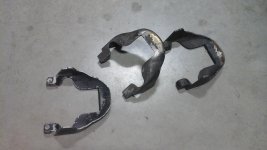M.B. Naegle
Diamond
- Joined
- Feb 7, 2011
- Location
- Conroe, TX USA

I need to cast 50 of these 'U' shaped aluminum covers that go to a sewing machine we manufacture. We are looking at redesigning the assembly that this piece is part of in the near future to be made out of sheet metal, but in the mean-time need to fill some orders. The last aluminum foundry we worked with was in New York (closer to where our company used to be) but has closed.
This piece was cast iron when it was first designed (1910 or so), and at some point they switched to cast aluminum using the same patterns. The original board pattern was lost at some point and they started using some castings with the holes plugged as patterns. I'd like to continue using these pieces since the part will be changing soon, and it is not a dimensionally critical part. They are approx. 6" by 6" and stand 2" tall at the highest point, but are 1/8" thick shells for the most part.
Does anyone on here have any recommendations for a small quantity aluminum casting job like this? I'm happy to ship them anywhere, but closer to the greater Houston Texas area is preferred.




 .
.